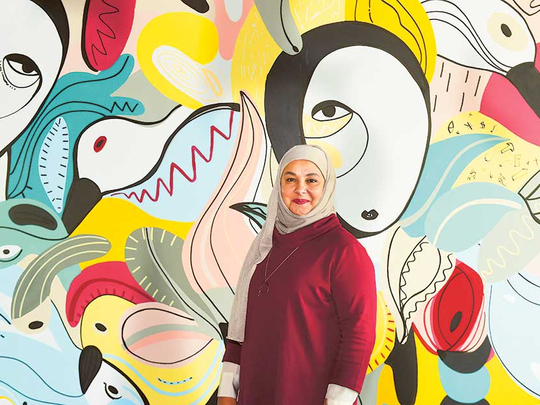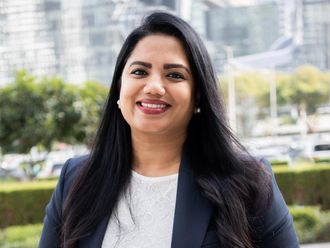
Dubai: Most Middle Eastern e-commerce businesses are owned and run by men. Kooot.com plays counterpoint with a woman-owned, woman-run portal aimed at selling to women.
Luma Bourisly, founder and vision creator of the e-commerce startup, said: “Being a female in an all-female core team, I have a much better understanding of the needs of my own gender and thus am able to provide something meaningful to women of this region. Ninety per cent of the products that we sell are exclusive and can only be found on our platform.”
Kooot.com sells clothing items, accessories, shoes, bags, household items and knick-knacks.
She said that there’s plenty of room for a new business to introduce something new, something different and compete on customer experience and quality of products and service. Let alone giving back to the community. “It’s a win-win for us and the community.”
“Kooot.com is a platform that aims to make Arab women’s lives easier by saving them time and effort. The portal targets the modern women in the Middle East. The reason for being niche is to cater for the needs of a segment that is not well catered for digitally,” she said.
Kooot.com was built on the premise that today’s woman is busier than ever and caught up in the fast pace of modern life as they strive in all avenues of work.
She said that she has been observing the digital space for years. “Working with a major telco in the UAE for the past decade gave me access to analytics on evolving trends, especially in the digital space.”
At the moment, the Middle East e-commerce market is valued at $4.9 billion (Dh18 billion). It’s predicted to reach $10 billion (Dh36.7 billion) in value by 2018. The eMarketer announced that the UAE’s share of B2C e-commerce alone on total retail sales of goods is forecasted to triple between 2014 and 2019.
“This forecast makes sense given the current internet penetration rate of 53 per cent in the Middle East region, which is seeing rapid year on year growth. Today, 20 million people in the Middle East are already online shoppers,” she said.
The statistics indicate that more and more people are heading towards online shopping, she said, and added that the growth rate of online shopping in the Middle East is even higher than the world’s largest markets, including the American market.
Today, she said that Middle Eastern internet users are more willing to use their credit cards online. E-commerce businesses have the airline sector to thank for that. The dominance of online ticket purchase in the airline sector has and will continue to drive growth in online shopping.
“We want to provide women with a space to speak their minds. We’re committed to empowering Arab women and enabling them to be economically independent — in a very practical way. We find that the regional market offers a large range of products,” she said.
However, she said that many women still don’t find what’s right for them for many reasons. It could be due to size unavailability, stock unavailability, colour, budget constraints, the long distance to their favourite shop, or simply shortage of time.
Her intention with the portal is to fill this gap, shrink the market to literally fit within the palm of each woman’s hand. It couldn’t be more convenient for the busy woman who wants to sample both the global and the local easily.
She said that she got the inspiration from Kuwait’s Souq Al Hareem, the Women’s Souq, which is rich with high-quality products produced by Arab women.
“Not only is our platform inspired by the economics livelihood of the souq. It is also inspired by the social function of the souq, as the souq was a place where women built and solidified their social bonds and networks,” she said.
The platform functions as a platform for dialogue amongst women, whether related to professional development, personal development, fashion and lifestyle, or anything else that is important to women.
She said that the platform provides tailored content of interest to shoppers and also invites women to write about and discuss what they are passionate about.
“As much as we believe in the business objectives of Kooot.com, we are equally interested in exploring writing talents within our communities. Our Conversations page is available in both Arabic and English. We want to be as inclusive and conversational as possible. For that reason, we built the platform in a way that enables engagement and dialogue, both on our blog and through reviews and comments on products within the marketplace,” she said.
The platform aims to be a profitable sustainable business that also contributes to the Middle East’s economy by providing an avenue for creative women to showcase their talent and become profitable small businesses by showcasing their work and selling on the portal.
Expansion plans
Kooot.com operates in four key markets — UAE, Kuwait, Saudi Arabia and Bahrain.
“We intend to cover the rest of the Gulf Cooperation Council countries within the first year of operations. In the future, we intend to introduce Kooot for men and Kooot for kids,” said Luma Bourisly, founder and vision creator of Kooot.com.
The platform, now seven months old, is fully owned and funded by Bourisly, but she said that she is in talks with handpicked investors who understand the vision of this space and add value to the business.












